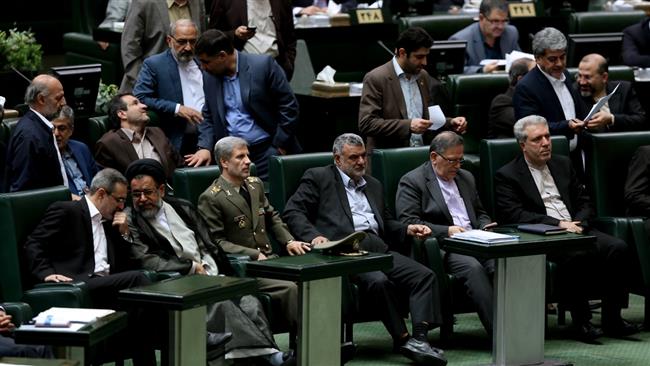UPDATE 1200 GMT: Continuing his recent toughened line on the 2015 nuclear deal — while trying to keep Iran in the agreement — President Hassan Rouhani told Parliament that his foreign policy priority is to protect the accord from the US.
“The most important job of our Foreign Minister is first to stand behind the JCPOA [Joint Comprehensive Plan of Action], and not to allow the US and other enemies to succeed,” Rouhani said. “Standing up for the JCPOA means standing up to Iran’s enemies.”
Last week Rouhani shifted his position, saying for the first time that Iran might leave the agreement that limited its nuclear program in return for a lifting of international sanctions. He said that, while adhering to the JCPOA, Tehran might be forced to return to production of 20% enriched uranium given new restriction adopted by the US Congress and signed by Donald Trump.
The President also tried to assert authority in the quest of economic recovery, facing the challenge not only of American sanctions but also internal challenges such as large stake of the Revolutionary Guards.
“The second responsibility of the Foreign Ministry…is to get involved in economic activities. It should help attract foreign investment and technology,” Rouhani said as he repeated the asssessment of Oil Minister Bijan Zanganeh that $200 billion in investment is needed for the oil and gas sector.
Parliament approved 16 of 17 nominees for the Cabinet, only rejecting proposed Energy Minister Habibollah Bitaraf, a reformist.
ORIGINAL ENTRY: Iran’s Parliament will vote on the 17 nominees for President Hassan Rouhani’s Cabinet on Sunday.
The Majlis has been debating the credentials of the nominees since Tuesday. Almost all are expected to win endorsement easily; however, Behrouz Ne’mati of the Parliament’s Presiding Board said “one or two” may be rejected.
Rouhani has named a balance of centrists and hardliners for the posts, with Foreign Minister Mohammad Javad Zarif remaining in place. But the President has been criticized for ignoring women — although he later appointed three female Vice Presidents — and the proposed Communications Minister, Mohammad Javad Azari Jahromi, has come under scrutiny because he carried out interrogations of political prisoners after the disputed 2009 Presidential election.

